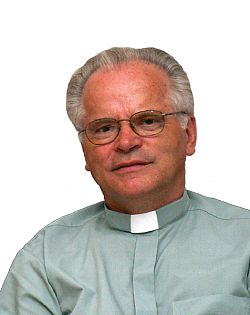Father Stanislaw Herba
SALT LAKE CITY — From Communist Poland to Brazil to the United States, Father Stanislaw Herba has celebrated Mass in many cultures during his 50 years as a priest. Over that time, too, his understanding of the Catholic faith has changed.
As a child, "of course they taught us that God is love but the attitude wasn’t so loving," he said, recalling that the pastor who taught the sacraments at his parish in Maziarnia, Poland, had a big stick in the classroom. "You grew up in that love, but you didn’t feel that love."
The letter of the law was important to him as a new priest, he said. He read the Pierre Teilhard de Chardin and was struck by the theologian’s writings about a person’s evolution. "When I was younger I thought that as I got older I would become almost perfect," he said with a laugh, "but I was wrong. … We’re saved by God’s mercy. It’s a grace. I think it takes time to [realize that]. When you’re younger you don’t see these things."
Now, he says, he still respects the law, but he is more concerned with the people it affects.
Fr. Herba grew up in a devout Catholic family in Poland in the 1940s. At the age of 6 he decided he wanted to be a priest.
"I was saying Masses for my classmates," he said, smiling. "Of course, I didn’t understand anything."
That desire faded as he grew. After high school, he was slated to attend a teaching college, but then he heard God’s call again and chose to enter the seminary.
While a seminarian in the 1960s, he attended the Catholic University of Lublin, Poland, where he often met the future Pope John Paul II, who taught at the university, he said. "He was a nice guy. You felt respect."
He was ordained a priest for the Society of Christ Fathers for Poles Living Abroad on May 17, 1954 in Poznañ, Poland by Archbishop Antoni Baraniak SDB. He was sent to minister in Brazil with five other priests. On the ship were 40 priests of different nationalities and 13 bishops returning from Vatican II, he recalls. One of the bishops was originally from Poland but was going to Brazil after being expelled from China.
The bishop said he wanted to meet with the priests who were coming from Poland, Fr. Herba said. The bishop told the priests that when they arrived in Brazil they would be tempted to be very critical about everything, but they shouldn’t do that because they wouldn’t understand the new culture.
"That was good advice," Fr. Herba said.
After 10 years in Brazil, he was sent to New Bedford, Mass., to minister to the Portuguese community there, and after a year moved to a Polish community in Rhode Island. Five years later he became pastor at a parish in Oregon.
"Then I decided to become a diocesan priest, and I wrote Bishop [William K.] Weigand," then Bishop of Salt Lake City, Fr. Herba said. "He wrote me a letter: ‘Please come and see me as soon as you can.’"
Fr. Herba arrived in Utah in 1989 and was assigned to Saint Vincent de Paul Parish. He ministered to Salt Lake City’s Polish community, which was sizable at the time; many of them came as refugees.
In 1990 he became pastor of Our Lady of Lourdes Parish in Magna. Over the next 20 years he served various other parishes and in 2010 received his current assignment, as pastor of Saint Mary of the Assumption in Park City.
For him, the most difficult part of being a priest is officiating at funerals because he is called to console the families, he said, but at the same time the funerals are the best part of his job because he is with the people and can listen to them and pray with them.
Fr. Herba is happy as a priest, he said. "If I had to choose again I would do it, probably with some improvements."
© Copyright 2024 The Diocese of Salt Lake City. All rights reserved.


Stay Connected With Us